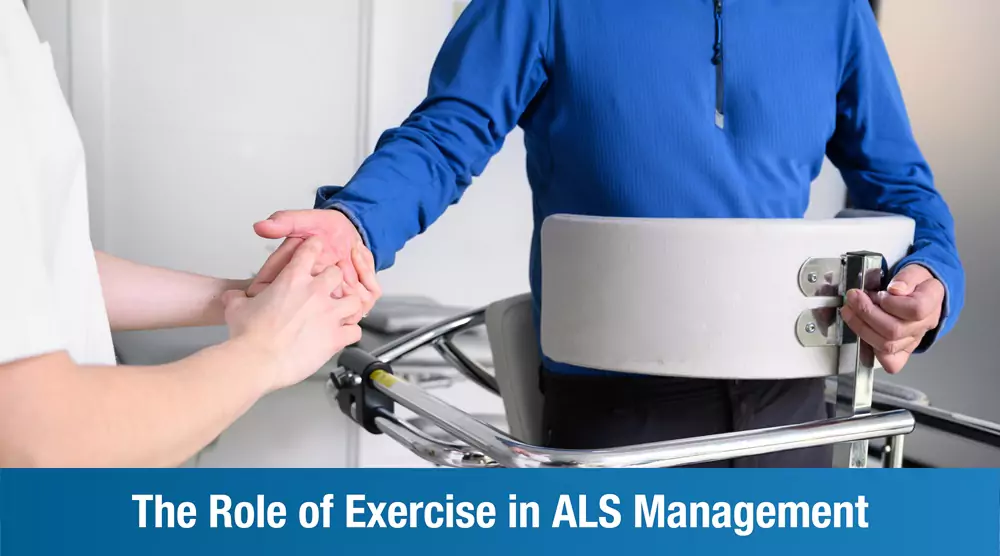
Living with Amyotrophic Lateral Sclerosis (ALS) is a daily challenge. As the motor neurons degenerate, the patient progressively loses the ability to move freely. However, exercise is proven to increase strength and mobility for ALS patients and reduce the risk of depression. It is important to exercise only according to the advice of a healthcare professional. Here is a quick guide to the benefits of exercise for ALS patients.
Understanding Motor Neuron Disease
Motor Neuron Disease is a group of neurodegenerative disorders that selectively affect motor neurons, i.e. the cells that control all the voluntary muscles of the body. These voluntary muscles are responsible for performing movements at one’s will.
Amyotrophic Lateral Sclerosis (ALS), also known as Lou Gehrig’s Disease, causes muscles all over the body to degenerate progressively — leading to the inability to move, speak, or swallow.
The Benefits of Exercise for ALS Patients
Exercise provides various benefits for individuals living with ALS, despite the progressive nature of the disease. Here are key advantages of incorporating exercise into the routine of ALS patients:
Maintains muscle strength – Regular exercise, designed according to the individual’s capabilities, helps slow decline in muscle strength and delay muscle atrophy.
Reduces muscle spasticity – Stretches help reduce muscle spasticity, provide relief from discomfort, and enhance overall comfort.
Improves posture – Targeted exercises help individuals with ALS maintain better posture. This helps prevent the development of musculoskeletal issues.
Improves joint function – Exercises focusing on joint mobility and flexibility can enhance range of motion, preventing stiffness and joint immobility.
Supports respiratory function – Exercises focused on respiratory muscles can help maintain respiratory function and assist with breathing.
Enhances cardiovascular health – Walking, swimming, and other low-impact aerobic exercises, improve cardiovascular health, promote overall well-being, and also help combat potential fatigue.
Enhances mental health and well-being – Engaging in regular physical activity can have positive effects on mental health. It reduces stress and improves cognitive function.
At our centres in Bangalore and Hyderabad, we provide a combination of physical therapy and occupational therapy that comprise tailored exercise routines. These routines can greatly improve quality of life for individuals living with ALS.
Our exercise plans are individualized, taking into account the unique needs and limitations of each ALS patient.
Read more about our rehabilitation programs for ALS here.
Tips for Exercising Safely With ALS
For those with ALS, it is essential to perform all forms of exercises under the close supervision of a rehabilitation professional, specialized in treating degenerative neurological disorders. They can tailor an exercise plan for you as part of the best Motor Neuron Disease treatment and monitor your progress. Here are some pointers to keep in mind:
Start small: Allow your body to get accustomed to the exercises by starting with short sessions of a few minutes each and then ramping it up as you feel stronger.
Perform cardio or aerobics: Walking, cycling, or other aerobic exercises performed at moderate intensity are ideal for those with ALS.
Break it up into sets: To help you get the most out of your exercise session without overdoing it, break the session up into segments that let you perform optimally with rest in between. For instance, if you are using a recumbent bicycle, you can have a 30-minute session broken up into parts of 10 minutes each.
Don’t forget to stretch: After a workout session, you should stretch your muscles to avoid fatigue and to recover faster.
Listen to your body: It is crucial that you pay attention to what your body needs and not overexert yourself. If you feel unwell during exercise, stop and rest. Do not try to push through fatigue, as that can have negative effects. If you feel cramps or twitches in your muscles, stop exercising at once and consult your therapist.
Consider using assistive gear: In addition to exercise, assistive devices like braces, orthotics, or wheelchairs can also enhance the patient’s mobility. Talk to your doctor about using one of these as needed.
While exercise cannot reverse the progression of ALS, incorporating a well-designed and supervised exercise routine can significantly contribute to maintaining functionality, promoting psychological well-being, and enhancing overall quality of life for individuals with this challenging neurodegenerative disorder.
If you wish to know more about our exercise routines for ALS patients, or wish to consult our team of highly-skilled and experienced physiotherapists, then reach out to our team today.
WhatsApp +91 89048 42087
Call +91 78159 64668 (Hyderabad) | +91 82299 99888 (Bangalore)
———–
FAQs
How can I extend my life with ALS?
A combination of physiotherapy, occupational therapy, and speech therapy have enabled patients to recognise and manage their symptoms well. As a regenerative treatment, stem cell therapy has shown significant improvement in patients with ALS.
What are the 7 stages of ALS?
ALS progression is typically categorized into seven stages, ranging from early symptoms to advanced mobility and respiratory challenges. You can read more about the 7 stages of ALS here.
Do ALS symptoms improve with exercise?
Individualized exercise plans can help to maintain muscle strength, improve joint function, and contribute to overall well-being. Additionally, regular exercise can also positively impact the physical and mental well-being of those living with ALS.
Can ALS stop progressing?
As a neurodegenerative disease, ALS typically progresses over time, leading to increased muscle weakness and loss of motor function. Therapeutic interventions like stem cell therapy, along with physical therapy, occupational therapy, swallowing therapy, etc can help manage symptoms and potentially slow down the progression.
What foods should be avoided with ALS?
It is advisable to limit the intake of refined sugars, processed foods, saturated fats, and potential allergens like gluten or dairy. Maintaining a balanced diet with nutrient-rich foods can support overall health. Please consult your doctor before beginning any diet or consuming any supplements.










